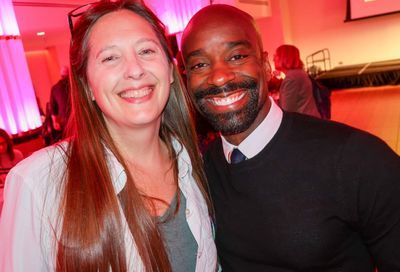Profanity and Puzzlement
The post-apocalyptic fairy tale Fucking A is a complicated, multi-voiced minefield that often breaks its own rules
We’re all adults here, yes?
We can handle a little swearing? A little vulgarity? A conversation that might veer into controversial areas like abortion, adultery and random, unprovoked acts of violence?
How about a play that involves all these subjects plus several catty exchanges about the state of a woman’s vagina conducted in an invented language? What if we include a band of kilt-wearing, Goth-meets-S&M, futuristic bounty hunters who bicker over who gets to keep the severed limbs of their human prey? An escaped convict bearing a mysterious scar who asks women, without shame, if they “Come here often?”
A hooker with a heart of gold? Or, excuse me, a “kept woman” with a heart of gold?
What if they all sing?

Kearse as Monster
(Photo by Scott Suchman)
That’s right. Suzan-Lori Parks’ post-apocalyptic fairy tale, Fucking A, now pacing a grim black box in The Studio Theatre’s 2ndStage, is a musical. Though it’s probably more accurate to simply note that there is music and singing and movement because, given Parks’ intense play with language and story, it could be that song is simply another linguistic device.
Fucking A is Parks’ meditation on Nathaniel Hawthorne’s 19th century novel The Scarlet Letter, the story of marked adulteress Hester Prynne. Without delving too much into the story (or providing another generation a set of notes on Hawthorne’s text with which to avoid reading the actual book) Prynne not only bears the weight of her own “crime,” but the impact that act has on her child.
Parks’ modern telling has very little to do with the setting of Hawthorne’s original, trading a puritanical Massachusetts for an unnamed city where a dictatorial mayor stands for law and abortionists are physically branded with an “A” that must always be kept visible. Parks’ Hester is one of these abortionists and the money she earns is used to make payments to the Freedom Fund, a program through which she is trying to buy her son out of jail.

Nelson as Hester
(Photo by Scott Suchman)
If all of this sounds like a little too much, you’re right. The playwright’s grim trip through a hope-lacking looking glass stretches patience and credibility. Neither finely knit patchwork nor abject failure, Fucking A suffers in a creative purgatory.
Some will rush to immediately finding fault with the play itself. Fucking A is a complicated, multi-voiced minefield that often breaks its own rules. The slogging dark interrupted by a jaunty song like “A Meat Man is a Good Man to Marry.” A twisted conference between the hunters set as a preamble to a three-part, not-so-harmonious singing of “The Hunters Creed.”
But this seems more to be a case where the space and set is actually working against material. The Studio 2ndStage is an interesting but intimate theater and the decision to hang Parks’ heavy play on a skeletal and largely empty set fails to help move the story.
In fact, the play and its actors feel like they’re all craving more space. More room to move about, some boundaries and reserve within which to build their world more palpably.
With some remove from audience, with some of the formality of a more traditional theater set, we might see the dark humor in the musical aspects of Fucking A brought more clearly to life. The show would gain traction as farce or socially critical satire. But cast as a kind of theatrical experiment it reads as forced and deliberately segregationist: If you were deep enough, you would appreciate what we’re doing here.
There are bright spots thanks to the hard work and strength of some of the show’s lead cast members. Jennifer L. Nelson is fascinating in the role of Hester, unafraid to come fully undone in the pursuit of her role.
Ashley Ware plays Canary, a woman whose friendship with Hester is one of the few pure relationships in the play. Ware deserves credit for the fearlessness with which she attacks the part. Her brazen and aggressive sexuality matched perfectly to the gentle kindness of Vince Brown’s Butcher.
Unfortunately, these performances are not enough to meld the pieces into a thought-provoking whole. Studio Theatre’s production of Fucking A might shock, but it fails to spark.
Support Metro Weekly’s Journalism
These are challenging times for news organizations. And yet it’s crucial we stay active and provide vital resources and information to both our local readers and the world. So won’t you please take a moment and consider supporting Metro Weekly with a membership? For as little as $5 a month, you can help ensure Metro Weekly magazine and MetroWeekly.com remain free, viable resources as we provide the best, most diverse, culturally-resonant LGBTQ coverage in both the D.C. region and around the world. Memberships come with exclusive perks and discounts, your own personal digital delivery of each week’s magazine (and an archive), access to our Member's Lounge when it launches this fall, and exclusive members-only items like Metro Weekly Membership Mugs and Tote Bags! Check out all our membership levels here and please join us today!




















